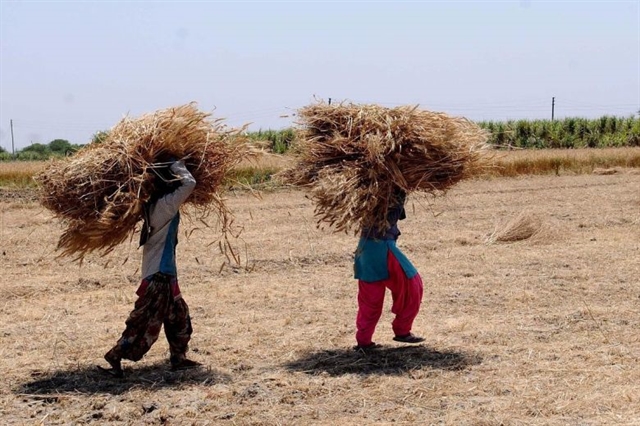 Society
Society


|
| Farmers carrying harvested crops (above) and farming activities being carried out in India's Uttar Pradesh state during the nationwide lockdown to curb the spread of the virus. The closure of mandis, where farmers sell their harvest, could lead to the crop harvest decaying or small farmers being forced to resort to distress sales of their produce to exploitative traders. — Photo THE HINDU BUSINESS LINE |
Rajalakshmi Nirmal
All across India, the springtime harvest of several winter crops has started, and farmers are sitting on truckloads of grains and pulses. But with a nationwide lockdown in place to control the spread of the coronavirus, mandis - where farmers sell their harvest - have been closed.
Initially, most states announced that the mandis would open from April 1, but it now appears this will not happen for two weeks more. This puts the crop harvest at risk of decaying - or, alternatively, small farmers could be forced to resort to distress sales of their produce to exploitative traders.
The effect was already starting to be felt when markets were open. Farmers at mandis in Agar, in Madhya Pradesh state in central India, were able to sell their agricultural produce only at prices that were sharply lower than the minimum support price set by the government as a threshold to support farmers.
If farmers are to secure a reasonable remuneration for their agricultural produce without compromising their safety, the government will need to take some measures to enable mandis to open up - with restrictions if necessary.
Here are a few points the central and state governments can consider.
The government can allow mandis to open during the lockdown, but with restricted timings. A time schedule can be announced for different villages, says Ms Kavitha Kuruganti, national convener of the Alliance for Sustainable and Holistic Agriculture. This can help avoid crowding at mandis.
Business Line contacted procurement agencies and it turns out that this is feasible.
In the same way that a list of essential services has been excluded from the lockdown, operations across the agri-value chain too should be excluded so that consumers do not face a short supply.
Prime Minister Narendra Modi launched a flagship scheme - the electronic National Agriculture Market (eNAM) - which established an e-marketplace. It is time to leverage its possibilities to the fullest.
Up until now, only traders (that is, market intermediaries) could buy on the platform; it is perhaps the optimal time to allow farmers and farmer producer organisations (FPOs, or farmers' collectives) to sell from the farm gate.
Farmers may be permitted to upload pictures of the commodity onto the eNAM application; buyers can then get a measure of the quality of the grains and pulses.
Once the deal is formalised, traders can be encouraged to make part-payment to the farmer and take delivery when the regular transport systems start functioning and state borders are opened.
Mandi boards can be authorised to oversee the smooth execution of the deal between traders and farmers. Right now, 585 mandis across 16 states and two union territories (that is, centrally administered territories) are on the eNAM platform; about 16 million farmers and 12.6 million traders are registered.
FPOs - there are about 5,000 registered across the country - can be incentivised to use hedging tools on the futures platform to avoid losses from a sharp fall in prices.
These derivative tools allow farmers to sell at pre-determined prices for a small fee. This effectively protects against the downside risk for farmers. — The Hindu Business Line
• This story was contributed by The Hindu Business Line for World News Day 2020.




